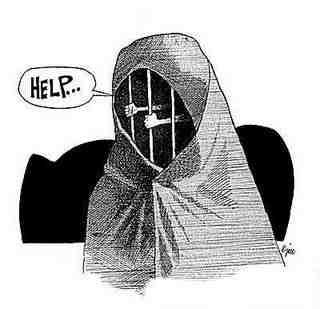At the hearings for Elena Kagan’s appointment to the Supreme Court, Senator Jeff Sessions rightly pointed out a dramatic inconsistency in the nominee’s capacity for outrage: While deploring the United States’ policy of “Don’t Ask Don’t Tell” in no uncertain terms, Dean Kagan enthusiastically welcomed the barbaric Islamic legal code of Shariah into Harvard Law School.

In 2008 then Harvard Law School Dean Kagan introduced a workshop called, “The Constitutional Judiciary in the Muslim World.” The goal of the workshop was to put an Islamic framework around the concept of a constitutional judiciary, or vice-versa. In most nations represented (and some, like Iraq and Afghanistan), the constitution puts primacy on the Islamic legal code of Shariah. In fact, Shariah is explicitly political as well, covering relations between Muslim and non-Muslim both inside and outside the judicial framework.
A photo of her at the event, beaming, graces the June 2009 newsletter of the lavishly-funded Harvard Islamic Legal Studies Program. The workshop was attended by judges from all over the Muslim world–judges, as the newsletter points out, “specialized in the application of Islamic law.”
Frank Gaffney sounded the alarm early, writing that “If Ms. Kagan had no trouble with people who advocate the murder of homosexuals having offices anywhere at her university, it would appear her determination to deny access to its campus to military recruiters bespeaks nothing more than hostility towards the armed services.”
The Left quickly leapt to Kagan’s defense, writing absurdly (and, as we’ve seen, typically) at Soros-funded Media Matters that anyone who’d be concerned about the nominee’s seeming endorsement of Shariah in US law and finance believes either Kagan is a Muslim or sympathetic to its most barbaric dictates.
Of course, it goes without saying Elena Kagan is not a Muslim. But she is a woman of the Left–a political movement that is, at this time, (to put it very charitably) agnostic about making cultural distinctions. In that worldview, favoring our Western legal system is mere chauvinism, an accident of birth; that there’s nothing about, say, the US Constitution that makes it objectively superior to any other legal system, least of all, Islamic Shariah.
If she holds this belief, it makes Kagan unfit to serve on the US Supreme Court. (I regret Sen. Sessions did not ask her about the relative “merits” of contrasting legal systems–especially in the context of appeals to foreign law now in vogue in progressive legal circles, but I doubt she’d have answered candidly in any case.)
But why would a leftist like Kagan have anything to do with promoters of Shariah, such a barbaric legal system that compares unfavorably to our own?
The answer is that Kagan, like Obama, Holder, and most of this administration, is mired in the kind of multiculturalism commonplace in higher education for the last forty years. Most often in the academy, the wages of multiculturalism aren’t too steep. In fact, there’s a lot to commend its embrace of non-Western cuisine, art, music and literature with seriousness. These, however, are insubstantial in comparison to the truly important things that separate cultures: freedom or tyranny, inquisitiveness or closed-mindedness, etc. Even the most empty-headed multiculturalists will agree that the relationship between the state and the governed in Islamic societies does not mirror the one established by our founding documents. Does this matter? What is preferable? What are the consequences of these approaches to the public character?
Asking these questions puts a lie to the self-image of curiosity and inquisitiveness of other societies by the multiculturalists (nearly always men and women of the Left), because they aren’t really interested in the answers. Any serious query into the differences between societies and cultures leaves one with answers that are hard to come to grips with.
Today’s Left multiculturalism is actually cultural relativism. Its goal, in discussing the myriad differences between Western and Islamic Shariah legal systems (using Kagan’s example of the 2008 Harvard Law School workshop), is a political statement: One is not preferable to another. And then, on purpose, the debate is closed.
There’s also another point to consider. The sniping propagandists predictably dodged the actual point–that, among human beings, the capacity for real outrage isn’t unlimited; there’s just too much to get worked up about in the world. That’s why what does move someone to make condemnatory public statements or to champion a cause matters.
For Elena Kagan–by then already seven years after Shariah-adherent Jihadis flew buildings into the World Trade Center–to be ignorant of the tenants of this theo-political code is unsurprising; that ignorance places her firmly within the mainstream of this administration and the cultural Left. But ignorance can be corrected. What’s so troubling about both Kagan and her ideological comrades is their adamant refusal to even entertain questions about Shariah’s incompatibility with the American judicial system and way of life.
COMMENTS
Please let us know if you're having issues with commenting.